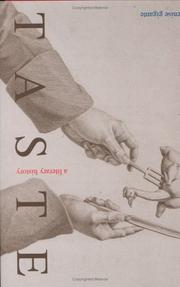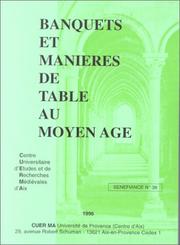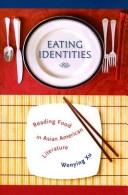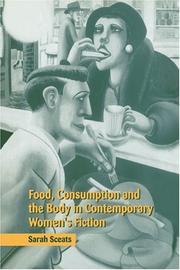| Listing 1 - 9 of 9 |
Sort by
|
Book
ISBN: 9780268038397 0268038392 0268089728 9780268089726 Year: 2013 Publisher: Notre Dame, Ind. : University of Notre Dame Press,
Abstract | Keywords | Export | Availability | Bookmark
 Loading...
Loading...Choose an application
- Reference Manager
- EndNote
- RefWorks (Direct export to RefWorks)
Pina Palma uses the central metaphor of food to uncover unexpectedly fresh dimensions of Renaissance intellectual traditions.
Italian literature --- Food in literature. --- Gastronomy in literature. --- History and criticism --- History and criticism.
Book
ISBN: 1789623634 1942954697 1942954689 9781942954699 9781942954682 9781789623635 Year: 2019 Publisher: [Clemson, South Carolina] : Clemson University Press in association with Liverpool University Press,
Abstract | Keywords | Export | Availability | Bookmark
 Loading...
Loading...Choose an application
- Reference Manager
- EndNote
- RefWorks (Direct export to RefWorks)
This volume of essays surveys gastronomy across global literary modernisms. Modernists explore public and domestic spaces where food and drink are prepared and served, as much as they create them in the modernist imagination through narrative, language, verse, and style. Modernism as a cultural and artistic movement also highlights the historical politics of food and eating. As the chapters in Gastro-Modernism reveal, critical trends in food studies alert us to many social concerns that emerge in the modernist period because of expanding food literacy and culture. The result is that food production, consumption, and scarcity are abiding themes in modernist literature and culture, reflecting tensions amidst colonial, agricultural, and industrial settings. This timely volume ultimately shows how global literary modernisms engage with food culture known as gastronomy to express anxieties about modernity as much as to celebrate the excesses modern lifestyles produce.
Gastronomy in literature. --- Food habits in literature. --- Food in literature. --- Modernism (Literature) --- Crepuscolarismo --- Literary movements --- History and criticism.

ISBN: 0300106521 9786611731250 1281731250 0300133057 9780300133059 9780300106527 9781281731258 6611731253 Year: 2005 Publisher: New Haven : Yale University Press,
Abstract | Keywords | Export | Availability | Bookmark
 Loading...
Loading...Choose an application
- Reference Manager
- EndNote
- RefWorks (Direct export to RefWorks)
What does eating have to do with aesthetic taste? While most accounts of aesthetic history avoid the gustatory aspects of taste, this book rewrites standard history to uncover the constitutive and dramatic tension between appetite and aesthetics at the heart of British literary tradition. From Milton through the Romantics, the metaphor of taste serves to mediate aesthetic judgment and consumerism, gusto and snobbery, gastronomes and gluttons, vampires and vegetarians, as well as the philosophy and physiology of food. The author advances a theory of taste based on Milton's model of the human as consumer (and digester) of food, words, and other commodities-a consumer whose tasteful, subliminal self remains haunted by its own corporeality. Radically rereading Wordsworth's feeding mind, Lamb's gastronomical essays, Byron's cannibals and other deviant diners, and Kantian nausea, Taste resituates Romanticism as a period that naturally saw the rise of the restaurant and the pleasures of the table as a cultural field for the practice of aesthetics.
Aesthetics, British. --- English literature --- Food habits in literature. --- Food in literature. --- Gastronomy in literature. --- Taste in literature. --- History and criticism. --- 82.01 --- 82.091 --- 82.091 Vergelijkende literatuurstudie --- Vergelijkende literatuurstudie --- 82.01 Esthetica --- Esthetica --- Aesthetics, British --- Food habits in literature --- Food in literature --- Gastronomy in literature --- Taste in literature --- Aesthetics, English --- British aesthetics --- English aesthetics --- History and criticism
Book
ISBN: 9888268694 9888180967 9789888180967 9888139975 9789888139972 9789888139972 9888139975 9789888139989 9888139983 Year: 2013 Publisher: Hong Kong
Abstract | Keywords | Export | Availability | Bookmark
 Loading...
Loading...Choose an application
- Reference Manager
- EndNote
- RefWorks (Direct export to RefWorks)
The culture of food and drink occupies a central role in the development of Chinese civilization, and the language of gastronomy has been a vital theme in literary productions through many different eras and genres. From stanzas on food and wine in the Book of Odes to the articulation of refined dining in The Dream of the Red Chamber and Su Shi's literary recipe for attaining culinary perfection, lavish textual representations help explain the unique appeal of food and its overwhelming cultural significance within Chinese society. These eight essays offer a colorful tour of Chinese gourmands whose work exemplifies the interrelationships of social and literary history surrounding food, with careful explication of such topics as the importance of tea in poetry, "the morality of drunkenness", and food's role in the objectification of women in certain classic texts.
Drinking in literature. --- Food in literature. --- Gastronomy in literature. --- Chinese literature --- History and criticism. --- S21/0600 --- S16/0195 --- China: Medicine, public health and food--Chinese food and cookery, (incl. tea) --- China: Literature and theatrical art--Thematic studies

ISBN: 2901104398 2821836929 9782901104391 Year: 1996 Volume: no 38 Publisher: Presses universitaires de Provence
Abstract | Keywords | Export | Availability | Bookmark
 Loading...
Loading...Choose an application
- Reference Manager
- EndNote
- RefWorks (Direct export to RefWorks)
History of civilization --- anno 500-1499 --- Dinners and dining --- Dinners and dining in literature. --- Food habits in literature. --- Gastronomy in literature. --- Repas --- Repas dans la littérature --- Habitudes alimentaires dans la littérature --- Gastronomie dans la littérature --- History. --- Histoire --- -Dinners and dining in literature --- Food habits in literature --- Gastronomy in literature --- Banquets --- Dining --- Eating --- Meals --- Caterers and catering --- Entertaining --- Etiquette --- Cooking --- Gastronomy --- Menus --- Table --- History --- Repas dans la littérature --- Habitudes alimentaires dans la littérature --- Gastronomie dans la littérature --- Dinners and dining in literature --- Dinners and dining - Europe - History. --- manières --- repas
Book

ISBN: 9782868205506 286820550X 9791034404933 Year: 2018 Volume: *5 Publisher: Strasbourg : Presses universitaires de Strasbourg,
Abstract | Keywords | Export | Availability | Bookmark
 Loading...
Loading...Choose an application
- Reference Manager
- EndNote
- RefWorks (Direct export to RefWorks)
Le xixe siècle, siècle de la gastronomie ? La Révolution qui lui donne naissance est, quoi qu'il en soit, également culinaire. Le Bourgeois s'empare de la table laissée vacante par l'Émigré, et fait du « ventre en majesté » l'indice de sa conquête sociale. Aiguillé par le nouveau discours gastronome et la diététique qui en découle, l'artiste - et en premier l'homme de lettres - semble quant à lui considérer sous un jour nouveau l'innutrition à l'origine de ses œuvres. Des Carnets de Joseph Joubert aux variations littéraires autour du Hungerkünstler, du Traité des excitants modernes de Balzac à la « gourmandise » salvatrice de Gide, l'art du xxie siècle interroge le lien entre rythme de la création et rythme de la nutrition. Parallèlement, la « physiologie du goût » inspire le discours critique, et fournit un nouveau paradigme pour dire le Beau en l'associant au Savoureux, louer ou disqualifier les œuvres en fonction de leur rapport à la nourriture. C'est cette « cuisine de l'œuvre » qu'abordent ici spécialistes de la littérature et historiens de l'art, en tentant de cerner un art de se nourrir où dialoguent discours esthétique, médical et politique.
French literature --- Gastronomy in literature --- Food in literature --- Littérature française --- Gastronomie dans la littérature --- Aliments dans la littérature --- History and criticism --- Congresses. --- Histoire et critique --- Congrès --- Littérature française --- Gastronomie dans la littérature --- Aliments dans la littérature --- Congrès --- Food in literature. --- French literature. --- Gastronomy in literature. --- Ernährung. --- Mahlzeit. --- Nahrung. --- Literatur. --- Französisch. --- 1800 - 1899 --- Langue d'Oil --- Französische Sprache --- Galloromanisch --- Belletristik --- Dichtung --- Schöne Literatur --- Sprachkunst --- Wortkunst --- Buch --- Schriftsteller --- Ernährung --- Mahl --- Speise --- Nutrition --- Ernährungsstatus --- Ernährungszustand --- Lebensmittel --- Nahrung --- Ernährungsstatus --- Ernährungszustand --- Ernährung --- littérature --- cuisine --- histoire de l’art --- XIXe siècle

ISBN: 0824862287 1435666771 0824878434 0824831950 Year: 2007 Publisher: Honolulu University of Hawai'i Press
Abstract | Keywords | Export | Availability | Bookmark
 Loading...
Loading...Choose an application
- Reference Manager
- EndNote
- RefWorks (Direct export to RefWorks)
The French epicure and gastronome Brillat-Savarin declared, "Tell me what you eat, and I will tell you who you are." Wenying Xu infuses this notion with cultural-political energy by extending it to an ethnic group known for its cuisines: Asian Americans. She begins with the general argument that eating is a means of becoming—not simply in the sense of nourishment but more importantly of what we choose to eat, what we can afford to eat, what we secretly crave but are ashamed to eat in front of others, and how we eat. Food, as the most significant medium of traffic between the inside and outside of our bodies, organizes, signifies, and legitimates our sense of self and distinguishes us from others, who practice different food ways. Narrowing her scope, Xu reveals how cooking, eating, and food fashion Asian American identities in terms of race/ethnicity, gender, class, diaspora, and sexuality. She provides lucid and informed interpretations of seven Asian American writers (John Okada, Joy Kogawa, Frank Chin, Li-Young Lee, David Wong Louie, Mei Ng, and Monique Truong) and places these identity issues in the fascinating spaces of food, hunger, consumption, appetite, desire, and orality. Asian American literature abounds in culinary metaphors and references, but few scholars have made sense of them in a meaningful way. Most literary critics perceive alimentary references as narrative strategies or part of the background; Xu takes food as the central site of cultural and political struggles waged in the seemingly private domain of desire in the lives of Asian Americans. Eating Identities is the first book to link food to a wide range of Asian American concerns such as race and sexuality. Unlike most sociological studies, which center on empirical analyses of the relationship between food and society, it focuses on how food practices influence psychological and ontological formations and thus contributes significantly to the growing field of food studies. For students of literature, this tantalizing work offers an illuminating lesson on how to read the multivalent meanings of food and eating in literary texts.
American literature --- Gastronomy in literature. --- Food habits in literature. --- Dinners and dining in literature. --- Cooking in literature. --- Asian Americans --- Asian Americans in literature. --- Food habits --- Asian American authors --- History and criticism. --- Intellectual life. --- Social aspects. --- Cookery in literature --- Asians --- Ethnology --- Literature --- Ethnic group --- Masculinity
Book
ISBN: 9048552028 9463728031 9789048552023 9789463728034 Year: 2022 Publisher: Amsterdam : Amsterdam University Press,
Abstract | Keywords | Export | Availability | Bookmark
 Loading...
Loading...Choose an application
- Reference Manager
- EndNote
- RefWorks (Direct export to RefWorks)
As the long sixteenth century came to a close, new positive ideas of gusto/taste opened a rich counter vision of food and taste where material practice, sensory perceptions and imagination contended with traditional social values, morality, and dietetic/medical discourse. Exploring the complex and evocative ways the early modern Italian culture of food was imagined in the literature of the time, Food Culture and the Literary Imagination in Early Modern Italy reveals that while a moral and disciplinary vision tried to control the discourse on food and eating in medical and dietetic treatises of the sixteenth century and prescriptive literature, a wide range of literary works contributed to a revolution in eating and taste. In the process long held visions of food and eating, as related to social order and hierarchy, medicine, sexuality and gender, religion and morality, pleasure and the senses, were questioned, tested and overturned, and eating and its pleasures would never be the same.
Food habits --- Food --- HISTORY / Europe / Italy. --- Foods --- Dinners and dining --- Home economics --- Table --- Cooking --- Diet --- Dietaries --- Gastronomy --- Nutrition --- History. --- Food Culture, Taste, Pleasure, Literary Imagination, Italian Renaissance Literature. --- Primitive societies --- Italian literature --- Food in literature. --- Gastronomy in literature. --- History and criticism. --- History --- Thematology --- anno 1500-1799

ISBN: 0521661536 1316274934 0511048734 1280162090 0511150865 0511485387 0511324758 0511118023 1107118158 0511017510 9780511017513 9780521661539 0511033494 9780511033490 9780511118029 9780511048739 9780511150869 9780511485381 9780521604550 0521604559 Year: 2000 Publisher: Cambridge : Cambridge University Press,
Abstract | Keywords | Export | Availability | Bookmark
 Loading...
Loading...Choose an application
- Reference Manager
- EndNote
- RefWorks (Direct export to RefWorks)
This study explores the subtle and complex significance of food and eating in contemporary women's fiction. Sarah Sceats reveals how preoccupations with food, its consumption and the body are central to the work of writers such as Doris Lessing, Angela Carter, Margaret Atwood, Michèle Roberts and Alice Thomas Ellis. Through close analysis of their fiction, Sceats examines the multiple metaphors associated with these themes, making powerful connections between food and love, motherhood, sexual desire, self identity and social behaviour. The activities surrounding food and its consumption (or non-consumption) embrace both the most intimate and the most thoroughly public aspects of our lives. The book draws on psychoanalytical, feminist and sociological theory to engage with a diverse range of issues, including chapters on cannibalism and eating disorders. This lively study demonstrates that feeding and eating are not simply fundamental to life but are inseparable from questions of gender, power and control.
Consumption (Economics) in literature. --- Eating disorders in literature. --- English fiction. --- English fiction - Women authors - History and crit. --- Food habits in literature. --- Food in literature. --- Human body in literature. --- Women and literature. --- English fiction --- Food in literature --- Women and literature --- Consumption (Economics) in literature --- Eating disorders in literature --- Human body in literature --- Food habits in literature --- Gastronomy in literature --- English --- Languages & Literatures --- English Literature --- History and criticism --- Women authors --- History --- Gastronomy in literature. --- History and criticism. --- Body, Human, in literature --- Human figure in literature --- Arts and Humanities --- Literature --- Nutritionary hygiene. Diet --- Fiction --- Thematology --- Carter, Angela --- Lessing, Doris --- Roberts, Michèle --- Ellis, Alice Thomas --- Atwood, Margaret --- ROMAN ANGLAIS --- FEMMES ET LITTERATURE --- CORPS HUMAIN DANS LA LITTERATURE --- NOURRITURE DANS LA LITTERATURE --- FEMMES ECRIVAINS --- HISTOIRE ET CRITIQUE --- 20E SIECLE --- ANGLETERRE --- Writers --- Food --- Book --- Auteurs. --- Boek. --- Literatuur. --- Thematologie. --- Verhalend proza. --- Voeding. --- Voedingshygiene Dieet. --- Atwood, Margaret. --- Carter, Angela. --- Ellis, Alice Thomas. --- Lessing, Doris. --- Roberts, Michele.
| Listing 1 - 9 of 9 |
Sort by
|

 Search
Search Feedback
Feedback About
About Help
Help News
News